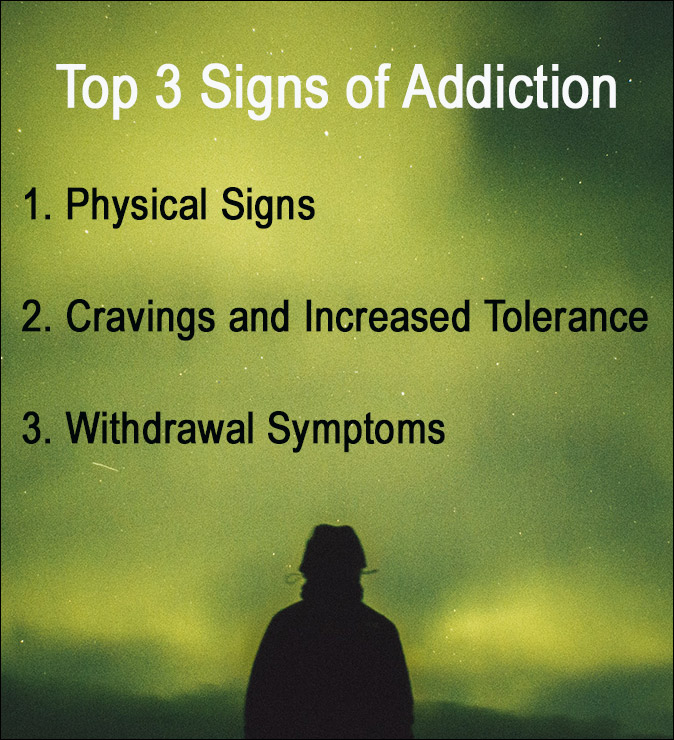
Addiction is a serious disease and it is imperative for it to be regarded as such. If addiction is left untreated it can result in a myriad of adverse effects for the addicted individual. The timeframe for the possible effects can range in severity and manifest in the short-term and long-term. The most severe possible consequence from addiction is death. Let’s take a look at some of the Signs of Addiction.
Abuse vs. Addiction
There is a common misconception that drug or alcohol abuse and addiction are synonymous. Though abuse of a foreign substance can lead to addiction, addiction and abuse are not tantamount. When an individual abuses a substance, he or she ingests said substance more than is healthy for his or her body to process.
One example of abusing a substance is taking a medication that is prescribed by a medical professional differently than the way in which it was prescribed, such as breaking up a pill and snorting it instead of swallowing it.
Another hypothetical example may be if an individual drinks more alcohol than his or her body is able to process, resulting in “blacking out.” Abuse of a substance can be considered the step immediately before the substance abuser is led to and possibly enters the stage of addiction.
Addiction is when the abuse of drugs or alcohol has become so consistent that the individual “needs” the foreign substance to function. If an individual regularly ingests a foreign substance in excess, the individual will manifest a dependency on the substance. This, in turn, is called addiction.
The severity of addiction can vary depending on the time period of substance abuse, type of substance abused, and amount or dosage of abused substance. Individuals are unique and therefore respond differently to quantities, dosages, types and frequencies of drugs or alcohol. Due to the fact that each person differs, the treatment for drug or alcohol addiction must be somewhat tailored towards each individual in need.
Signs of Addiction
1. Physical Signs of Addiction
Individuals who are addicted to drugs or alcohol will display physical signs of his or her addiction. The physical signs will vary depending on the drug of choice.
Regardless of the substance, in many cases it is possible to notice a person is abusing drugs or alcohol by looking at their eyes. One’s pupils may appear dilated or contracted, or the whites of the eyes might appear bloodshot or they may simply appear glazed. If this is a normal occurrence that continues for a long period of time, it could be a clue that there is a problem.
Abrupt weight changes, either drastic weight loss or significant weight gain, can also be a sign of drug misuse. While this alone can be a signal that something else is happening, it might be something to watch.
More serious issues like not showering for days on end, rotting teeth from worn enamel caused by certain drug use, and other radical changes in appearance are sometimes clues that a person has become addicted to drugs or alcohol.

2. Cravings and Increased Tolerance
When addiction has taken over an individual’s body, he or she will go to extreme lengths to satisfy his or her substance cravings. The tolerance of an abused substance will often rise exponentially in an addicted individual.
This rise in tolerance will increase one’s cravings for his or her drug of choice, perpetuating the cycle of substance abuse and advancing to an addiction.
A mild tolerance might not be cause for alarm but a severe tolerance combined with daily cravings that must be met for alcohol or drugs that spiral out of control, is usually a significant warning sign that addiction is imminent.
3. Withdrawal Symptoms
When a person abuses drugs or alcohol over a long period of time, their brain goes through structural and functional changes and relies on the abused substance to function on a daily basis. They are addicted to the substance and will become sick if they can’t get access to their drug of choice.
These are the symptoms of withdrawal, and the intensity and longevity of one’s withdrawal symptoms will depend greatly on one’s drug of choice, along with the frequency of use and dosage abused. Some possible short-term withdrawal symptoms when stopping use of a substance can include:
- Sweats
- Fever
- Chills
- Nausea
- Irritability
- Vomiting
- Depression
- Exhaustion
Regardless of the substance of choice, withdrawal from any abused substance can be extremely dangerous. It is best to go through the detoxification process under the supervision of a medical professional, due to possible health complications.
A medical health professional will be able to help the addicted individual manage his or her withdrawal symptoms and possibly provide guidance as to how to deal with the discomfort.
Further Resources
The signs mentioned above are merely a few of the possible signs that can be exhibited in an individual addicted to drugs or alcohol. If there is any concern for yourself or a loved one, it is essential to seek help. Medical and psychological professionals can be good resources to contact, as they will be able to provide proper guidance, or at the very least provide helpful references and resources.
Related Posts
- Alcoholism Statistics and Facts
When asked what they think is the most heavily abused drug in the United States,…
- 9 Celebrities Who Overcame Their Heroin Drug Addiction
In the past, many famous people have kept quiet about their addictions. Thanks to the…
- Signs of a Toxic Relationship and How To Leave
Signs of a Toxic relationship are a serious problem for many people in this world. It…
